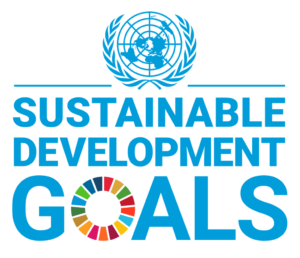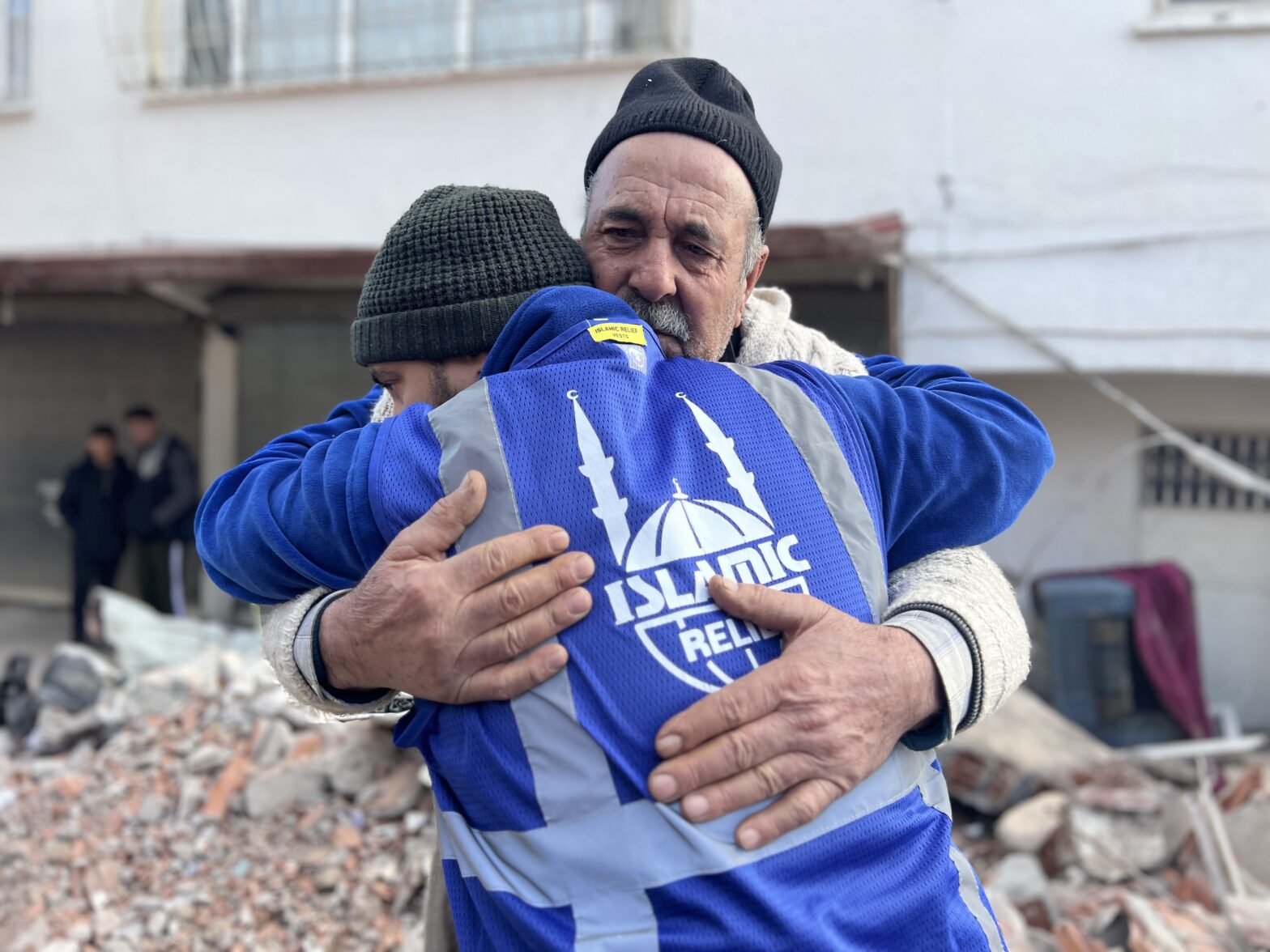
On 5 February 2023, Ahmad and Emina settled down to sleep, while in another country, Ali sets out for work, never imagining that before dawn a disaster would change their lives forever.
Father-of-5 Ahmad was used to the quiet rhythm of life in his village in the Syrian countryside, until violence reached his community.
“Our village transformed from a haven of peace into a tapestry of chaos and despair,” says Ahmad. “Work ceased, and food became scarce, forcing us into a nomadic life, moving from one village to another in search of safety.”
Eventually Ahmad realised that his family would find no safe place in Syria.
“We made the heart-wrenching decision to leave everything behind. With nothing but the clothes on our backs, we embarked on a perilous journey to Türkiye,” says Ahmad, who managed to find an apartment to rent in Yağdöver village, to the south of Gaziantep.
At the epicentre of disaster
Gradually, the family started to feel safer – until the early hours of 6 February, when they found themselves at the epicentre of a major disaster.
“The earthquake struck without warning, shaking the very foundations of our home,” remembers Ahmad, describing the shock of the powerful quake, which measured 7.8 on the Richter scale.
“We rushed outside, watching in horror as the earth convulsed. Our house, our sanctuary, crumbled before our eyes, but thankfully, our lives were spared.”
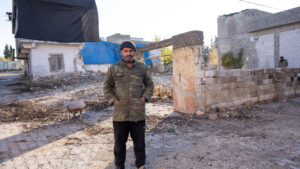
In Kahramanmaraş, north of Gaziantep, Emina was also wrenched from sleep.
“My husband wasn’t home when the earthquake struck. It was just me and the children,” says the 47-year-old Turkish mother.
“I had to calm my children and save them. I was more focused on ensuring their safety than my own. We somehow managed to escape outside barefoot, amidst the rain and snow. It was a scene of utter despair.”
Across the border in Syria, Ali’s world was falling apart.
“I was working in the bakery that night,” remembers Ali, whose family were sleeping at home.
“Everything around me started shaking violently. I rushed out of the building. The scene was horrifying – buildings were shaking violently and collapsing, one after another. But the real shock was waiting for me at home. Everything was destroyed. I started searching the rubble, but silence reigned. My eyes searched for any sign of life. For 3 full days, I dug and searched, but in vain.”
At 30 years old, Ali had lost his wife and 5 children.
“I lost my family… I lost everything. In those difficult moments, memories of my children and images of their innocent faces haunted my mind. I remember their laughter and hugs. I screamed at the top of my lungs for my children who were taken from me.”
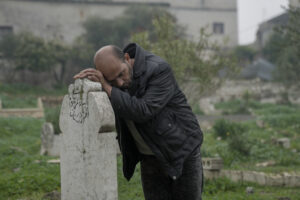
Ahmad, Emina, and Ali faced more devastation to come. Hundreds of aftershocks, including a tremor almost as strong as the first, inflicted more destruction on already shattered communities in Türkiye and Syria.
Around 57,000 people died, and many more were injured. The damage was widespread: the disaster affected 11 Turkish provinces, including some of the country’s poorest places and parts of Syria where most people already relied on humanitarian aid.
From the first day of the disaster Islamic Relief was a lifeline.
We reached tens of thousands of survivors with food, water, blankets and hygiene items as well as cash and vouchers. Emina was among those we helped: the family received food, blankets, and clean water as well as vouchers with which they bought essentials.
Islamic Relief is helping rebuild lives in Syria and Türkiye
In the months that followed, families in Syria swapped flimsy tents for sturdy shelters built by Islamic Relief. We began work to repair water infrastructure, and to strengthen struggling healthcare facilities. Islamic Relief expanded efforts to restore farming and herding livelihoods. Teachers received training and pay through a 2-year project that will rebuild schools.
In Türkiye, we kick-started similar interventions to reconstruct schools and expanded our work supporting families to build reliable livelihoods. Ahmad has been involved with one of our livelihoods projects for years.
“Back in Syria, I was a shepherd. [Losing my livelihood] left a void that was hard to fill,” says Ahmad, who was holding onto hope when he found Islamic Relief. “They offered me 13 sheep and a ram, along with feed. This gesture was more than just a gift; it was a lifeline, an opportunity to rebuild.
“The sheep became a source of sustenance and income. They provided milk, cheese, and meat, helping us survive in our new reality. It was a challenging endeavour, especially during the harsh winters, but it brought a sense of purpose back into my life.”
In addition Islamic Relief Türkiye expanded its orphan sponsorship programme, helping care for more than 4,000 vulnerable children in the country and in Syria.
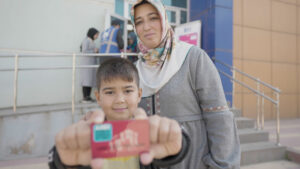
Millions of people face deepening poverty and hardship
One year after the disaster, 17 million people still face a long road to recovery. The scale of the challenge is enormous: across both countries, the cost of recovery and reconstruction could be as high as $80 billion. Already, poverty is deepening and development gains are slipping away.
Many people are still living in tents and makeshift shelters with little access to vital services. Ahmad and his family are among them: right after the quake destroyed their apartment, the Turkish government gave them a tent, and in time, a caravan beside the ruined building. They dream of the day their apartment is rebuilt, and they can return.
“We longed for the warmth and security of our old home, but all we had were memories.”
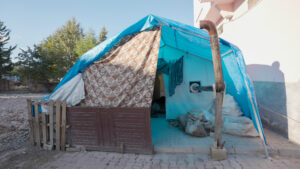
Emina too, is yet to return home: her family are still in temporary accommodation while waiting for their home to be rebuilt. A year later, the mother-of-2 remains traumatised by her experiences in the disaster.
“I feel intense fear for my children and am still experiencing the effects of shock,” she says.
“In the months following the earthquake, we endured many hardships. We couldn’t adapt to the new reality, but we are grateful to God for sparing us from worse. Perhaps this was a warning, but I’m not sure if we understand it.”
Grieving and traumatised, Ali still lives with his parents in a makeshift tent amid the ruins of his family home in Azmarin, near Idleb, Syria.
“My heart aches for losing [my family]. I pray to God to grant me patience and strength. The tent has become my shelter. I am afraid to live in concrete houses for fear of them collapsing over my head as it happened to my family. The ground shakes from time to time, and I am seized by panic and fear. My heart races, and I remember my children and what happened to them.
“A year has passed since my family’s departure. My life has completely changed, I am living in a state of shock, misery, and tragedy. We mainly rely on humanitarian aid to meet our basic needs.”
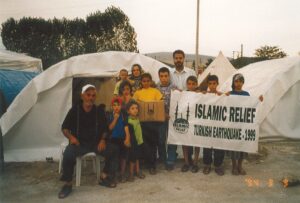
Islamic Relief has been responding to earthquakes and other crises in the region since the 90s. On the anniversary of the latest deadly quakes, we are re-affirming our commitment to survivors like Ahmad, Emina and Ali. People battered by this disaster, but not broken. We will remain by their sides as they begin the huge task of rebuilding their shattered lives and communities.
“Now, we face many challenges, but your assistance greatly alleviates our burden,” points out Emina, while Ahmad reflects that his is “a story of resilience and hope.”




